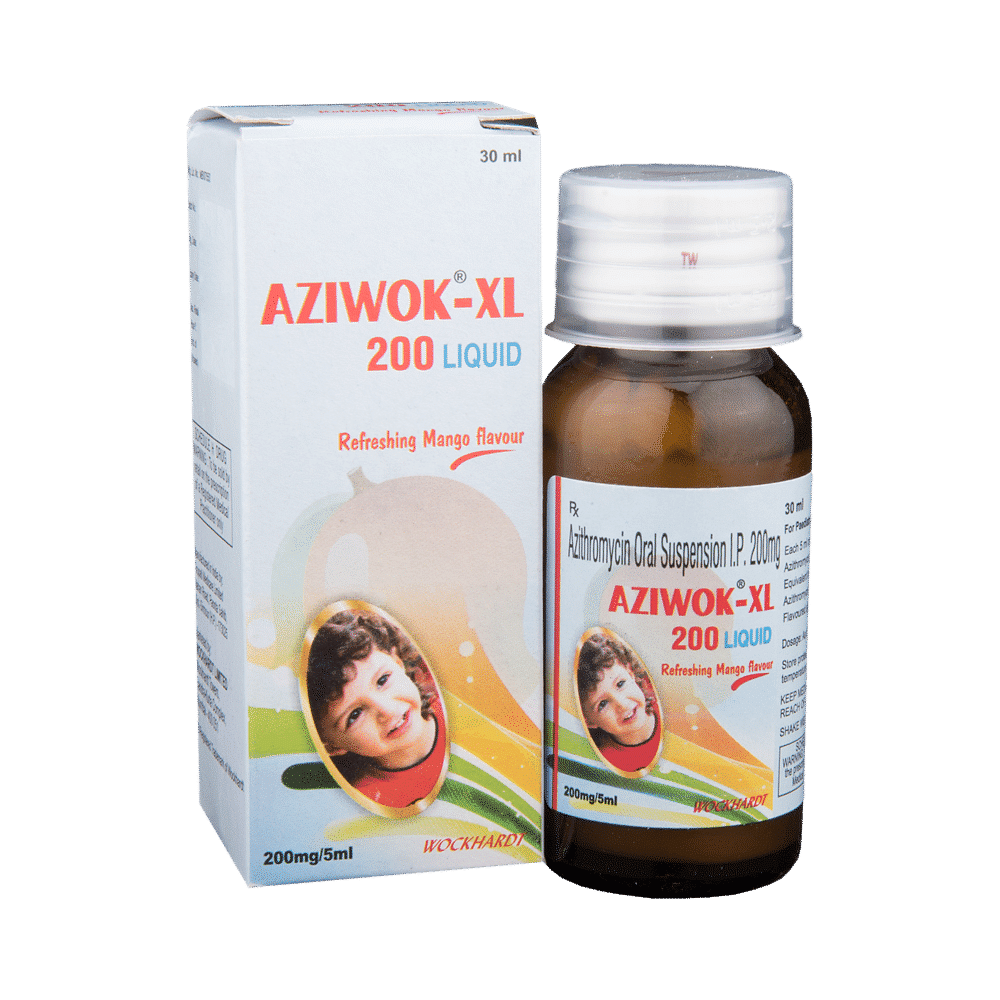
Azigard 200mg/5ml Suspension
Manufacturer
Vanguard Therapeutics Pvt Ltd
Salt Composition
Azithromycin (200mg/5ml)
Key Information
Short Description
Azigard 200mg/5ml Suspension is an antibiotic medication used to treat a wide range of bacterial infections in children.
Dosage Form
Suspension
Introduction
Azigard 200mg/5ml Suspension is an antibiotic medication commonly given to children for the treatment of bacterial infections targeting the ear, eyes, nose, throat, lungs, skin, and gastrointestinal tract. It is essential to complete the entire course of this medicine to avoid the bacteria multiplying again or causing another infection.
Directions for Use
Give Azigard 200mg/5ml Suspension with food to avoid an upset stomach. Encourage your child to drink plenty of water in case diarrhea develops as a side effect.
How it works
Azigard 200mg/5ml Suspension is an antibiotic that works by interfering with the synthesis of essential proteins required by bacteria to perform important functions. It stops the infection-causing bacteria from growing further and prevents the infection from spreading.
Quick Tips
Complete the entire course of this medicine to avoid the bacteria multiplying again or causing another infection Give Azigard 200mg/5ml Suspension with food to avoid an upset stomach Encourage your child to drink plenty of water in case diarrhea develops as a side effect Azigard 200mg/5ml Suspension will not be effective for viral infections Only give Azigard 200mg/5ml Suspension to your child for their current infection
Related Medicines

Azisuper 200mg/5ml Suspension

Laz XL 200mg/5ml Suspension

Axithro 200mg Suspension

Azilet 200mg/5ml Suspension

Zirro 200mg/5ml Suspension

Aziwok-XL 200 Liquid

Avaya 200mg/5ml Suspension

Azikem Suspension

Azitus 200mg/5ml Suspension

Laz 200mg/5ml Suspension
Frequently asked questions
What if I give too much of Azigard 200mg/5ml Suspension by mistake?
Azigard 200mg/5ml Suspension is unlikely to cause harm if an extra dose is given by mistake. However, if you think you have given too much of Azigard 200mg/5ml Suspension to your child, it's important to contact a doctor immediately. Overdose may result in unwanted side effects and could worsen your child's condition.
Are there any possible serious side effects of Azigard 200mg/5ml Suspension?
Some serious side effects of this medicine include persistent vomiting, kidney damage, allergy, diarrhea, and severe gastrointestinal infections. It is crucial to consult a doctor in case of these side effects.
Can other medicines be given at the same time as Azigard 200mg/5ml Suspension?
Azigard 200mg/5ml Suspension can sometimes interact with other medicines or substances. It is important to inform your doctor about any other medications your child is taking before starting Azigard 200mg/5ml Suspension. Always confirm the dosage and timing of medication with a healthcare professional before giving any medicine to your child.
Can I get my child vaccinated while on treatment with Azigard 200mg/5ml Suspension?
Antibiotics usually do not interfere with the ingredients in vaccines or cause a bad reaction in a child who has just been vaccinated. However, children taking antibiotics should not get vaccinated until they recover from the illness. As soon as your child feels better, the vaccine can be given.
Which all lab tests should my child undergo while taking Azigard 200mg/5ml Suspension on a long-term basis?
The doctor may recommend regular kidney function and liver function tests during long-term treatment to monitor your child's condition.
Can Azigard 200mg/5ml Suspension impact my child’s digestion?
Children often have a sensitive stomach, and medications can cause digestive upset. When antibiotics are given, the good bacteria in their gut may be affected. Azigard 200mg/5ml Suspension can kill off both harmful and beneficial bacteria, increasing your child's risk of developing other infections. If your child is having diarrhea while on Azigard 200mg/5ml Suspension, do not stop the medicine course. Instead, call your child’s doctor to ask for the next steps. In some cases, the doctor may adjust the dose.
Why is Azigard 200mg/5ml Suspension given for 3 days?
The duration of treatment depends on the type of infection being treated and the age of the patient. Azigard 200mg/5ml Suspension is not necessarily given for 3 days. In most bacterial infections, a single dose of 500 mg is given for 3 days. Alternatively, it can be given as 500 mg once on day 1 and then 250 mg once from day 2 to day 5. The specific dosage may vary depending on your child's condition.
Can you get a yeast infection from taking Azigard 200mg/5ml Suspension?
Some people may experience a fungal or yeast infection known as thrush after taking Azigard 200mg/5ml Suspension. Antibiotics like Azigard 200mg/5ml Suspension can kill off the normal or 'good' bacteria of your intestine responsible for preventing thrush. You should inform your doctor if you experience a sore, vaginal itching, or discharge, as well as any white patches in your mouth or tongue after taking Azigard 200mg/5ml Suspension or soon after stopping it.


